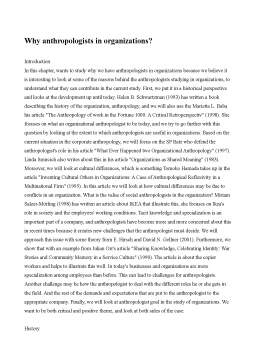Extras din referat
Introduction
In this chapter, wants to study why we have anthropologists in organizations because we believe it is interesting to look at some of the reasons behind the anthropologists studying in organizations, to understand what they can contribute in the current study. First, we put it in a historical perspective and looks at the development up until today. Helen B. Schwartzman (1993) has written a book describing the history of the organization, anthropology, and we will also use the Marietta L. Baba his article "The Anthropology of work in the Fortune 1000: A Critical Retroperspectiv" (1998). She focuses on what an organizational anthropologist to be today, and we try to go further with this question by looking at the extent to which anthropologists are useful in organizations. Based on the current situation in the corporate anthropology, we will focus on the SP Bate who defend the anthropologist's role in his article "What Ever Happened two Organizational Anthropology" (1997). Linda Smircich also writes about this in his article "Organizations as Shared Meaning" (1983). Moreover, we will look at cultural differences, which is something Tomoko Hamada takes up in the article "Inventing Cultural Others in Organizations: A Case of Anthropological Reflexivity in a Multinational Firm" (1995). In this article we will look at how cultural differences may be due to conflicts in an organization. What is the value of social anthropologists in the organization? Miriam Salzer-Mörling (1998) has written an article about IKEA that illustrate this, she focuses on Ikea's role in society and the employees' working conditions. Tacit knowledge and specialization is an important part of a company, and anthropologists have become more and more concerned about this in recent times because it creates new challenges that the anthropologist must decide. We will approach this issue with some theory from E. Hirsch and David N. Gellner (2001). Furthermore, we show that with an example from Julian Orr's article "Sharing Knowledge, Celebrating Identity: War Stories and Community Memory in a Service Culture" (1990). The article is about the copier workers and helps to illustrate this well. In today's businesses and organizations are more specialization among employees than before. This can lead to challenges for anthropologists. Another challenge may be how the anthropologist to deal with the different roles he or she gets in the field. And the rest of the demands and expectations that are put to the anthropologist to the appropriate company. Finally, we will look at anthropologist goal in the study of organizations. We want to be both critical and positive theme, and look at both sides of the case.
History
To begin with, we will write a little about why anthropologists first began to study companies and organizations. We have analyzed Schwartzman (1993). Corporate and organizational anthropology is a relatively new discipline within anthropology. There are three people that should be cited as precedent for this kind of anthropology. Frederick W. Tylor (1850-1915) was a practitioner and is called the standard flights applying champion. Taylor worked out four principles which was to study the detailed working process, to find the perfect work for the job, thorough training and proper equipment, and finally that the relationship between labor and management is important. Taylor was concerned that everyone is good at something. In his studies is the efficiency of the work that the main focus. Then Max Weber (1864-1920) describing the human bureaucracy. According to his theory of bureaucracy should people be trained and employed on the basis of learned skills. Finally, we mention Elton Mayo (1880-1949), a psychologist who researched the industry. He was involved Hawthorne Project. This project is thoroughly explained in Schwartzman (1993).
In 1927 it launched a major research project on Hawthorne-plantation in the U.S This is considered the beginning of the business and organizational anthropology. Hawthorne-plantation was located partly in the west of Chicago and partly in the town of Cicero, Illinois. At this time there were a total of 29,000 employees in the company, and employees representing more than 60 nationalities. Originally, the study of Hawthorne-plantation initiated because the management wanted to find the relationship between fatigue, monotony, satisfaction and dissatisfaction. RATR experiment (Relay Assembly Test Room) is the best known from the Hawthorne program. It went on to study an individual case in great detail, to determine the factors that can lead to productivity. The first time they performed this experiment were five women in isolation from the rest of the working group. Basic information about women and their performance was first examined, and then examined the effect of various variables, such as breaks, shorter days, free lunch and encouraging payroll plans. They began the surveys in 1924, but was just confused by the results that were difficult to interpret. So they asked the Harvard Business School to help interpret confusing results. Thus, the psychologist engaged in the Mayo project, which Taylor had started, and he had worked with Fritz J. Roethlisberger which began working with William Dickson and other researchers. The most interesting and controversial discovery of this stage of the program is called the Hawthorne effect: the unexpected impact of non-experimental variables on the experimental results "(Finlay, 1991:1820 in Schwartsman, 1993:6). Later in the study, they found more confusing results showed a general increase in the performance of workers in spite of variables such as removing some rewards.
Preview document
Conținut arhivă zip
- Why Anthropologists in Organizations.doc












